 Abengoa
Abengoa
Annual Report 2009
- Corporate Social Responsibility Report
- Abengoa and Its People
- Labor Practices and Equal Opportunities
Abengoa Workforce
In 2009, Abengoa’s average staff headcount totaled 23,323, up 0.4% from 2008.
As of December 31, 2009, Abengoa staff totaled 24,015 people, up 3.4% from year-end 2008.
The table below shows average staff numbers by business group, as well as a comparison with 2008 figures.
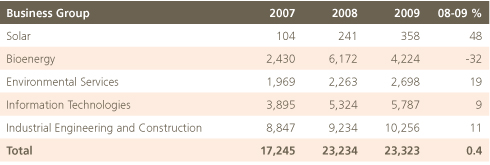
In terms of the different territories in which Abengoa operates, the staff percentage breakdown was as follows at December 31, 2009:
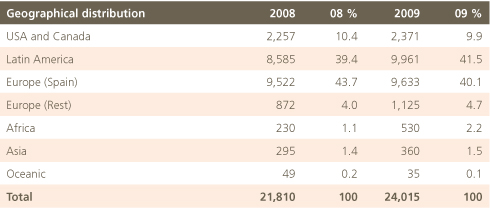
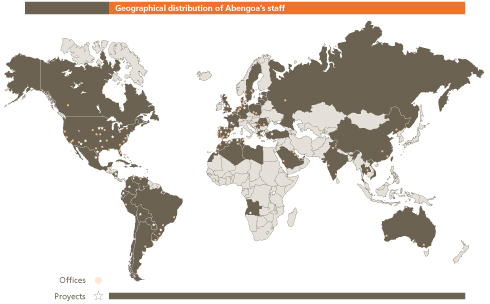
Evolution in the different geographical areas in 2009 with respect to 2008 is as follows:
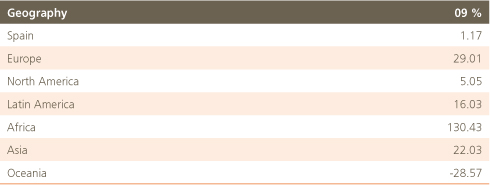
In terms of the nature of the labor relationship, and distinguishing between employees and operators, the total percentage of permanent employees in 2009 stood at 50%.

Most employees (90%) have a full-time contract, with the proportion of part-time contracts bearing little relevance.
The following depicts the age pyramid and the average age of Abengoa’s staff, drawing a distinction between men and women:


La plantilla media de Abengoa por categorías profesionales es la siguiente:

Employee turnover rate (voluntary, undesired terminations) at Abengoa stands at 1.31%, as reflected in the table below, broken down by gender:

Equality Between Men and Women and Staff Diversity
In concert with its statement on the condemnation of all types of discrimination, Abengoa actively encourages the promotion of equal opportunities and treatment between men and women.
Abengoa safeguards and promotes equality between men and women by applying this principle in all of its human resource management policies, including hiring, recruiting, training, performance assessment, promotion, compensation, working conditions, family-work life balance, communication and the prevention of harassment.
Within this context, Abengoa has its own Framework Gender Equality Plan, which extends to all company employees and seeks, on the one hand, to ensure equal treatment and opportunities between men and women and, on the other, to avoid any situation that constitutes, or could constitute, direct or indirect labor discrimination on the grounds of gender.

Abengoa has its own Framework Gender Equality Plan, which extends to all company employees.
This plan has led to the creation of the Office for Equal Treatment and Opportunities, the mission of which is to advocate for gender equality throughout the organization, as well as an international committee for monitoring and development, which, on an annual basis, and presided over by the director of Human Resources, brings together those in charge of Human Resources from each business unit, as well as Abengoa’s directors of Development and Corporate Social Responsibility as permanent committee members. This committee is supported, depending on the case in question, by international experts in the field, as well as professionals and technicians from governmental institutions and organizations.
The diversity of Abengoa’s staff is an undisputed fact; different nationalities, ages and religions coexist within the company, which, in pursuit of smooth and complete integration, has opted for optimal talent management and the pursuit of excellence in performance.
In 2009, Abengoa implemented a whistleblower protocol for harassment in the workplace in order to deal with any potentially discriminatory situation within the company.
This protocol addresses whistleblower procedure and defines the situations that may constitute harassment. This is handled in accordance with the principles of confidentiality, credibility and timeliness in order to ensure and protect the privacy, dignity and rights of company employees.
Staff Breakdown by Gender; Proportion of Women in Managerial Positions; Origin of Local Managers
The distribution between men and women at Abengoa at year-end 2009 stood at 16.81%, representing a year-on-year increase of 0.06 points in percentage terms.
In terms of the total number of employees, the proportion of women rose to 28.03%, up 0.44 points in percentage terms from year-end 2008.
Female representation on Abengoa’s Board of Directors stands at 20%.
90% of Abengoa’s managers come from the local community in which key operations are conducted.

Abengoa’s Remuneration Policy
At Abengoa there are no differences in starting salary data between men and women for positions of equal responsibility, for both are based on the salary tables established under applicable collective agreements or on Abengoa’s internal salary tables, which do not differentiate for reasons of gender.
The compensation system adheres to legal regulations and to the commitments and principles that govern Abengoa policies. It takes into account structure, capacity, performance and work quality, thereby ensuring equal treatment and opportunities.
The table below depicts the percentage difference between Abengoa’s standard starting salary and local minimum wage, taking different professional categories into account.
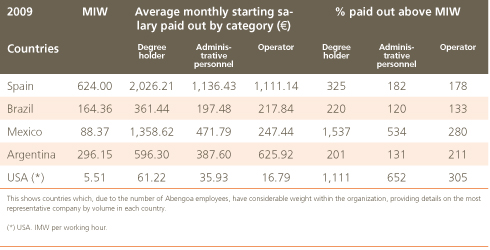
Condemnation of Forced and Child Labor and the Right to Freedom of Association and Union Representation
All Abengoa employees fall within the scope of labor regulations, according to the nature of their activities and the countries involved, and are also subject to the company’s own internal standards. In addition to the legal protection offered in each country, special emphasis is placed on the collective bargaining agreements of the industry, territory, or those of the company itself, as signed by workers or their union representatives, depending on each case.
Abengoa’s Code of Conduct, which applies to all employees, is based on the fundamental idea that the company’s reputation and success depend on the honesty, integrity and sound judgment of its employees, directors and officers in their relations with customers and prospects, colleagues, competitors, governing bodies, the media and all other parties or institutions with which the company has contact.
Abengoa’s principles and commitments, highlighted at the beginning of this chapter, also come into play.
With the foregoing in mind, Abengoa respects and supports the free association of its workers, holding this to be an inalienable right, and through ongoing dialogue with workers’ representatives, employees are kept abreast of all areas of interest to them.
Furthermore, Abengoa condemns all forms of forced labor and child exploitation, and supports all efforts to eradicate child labor.
As a basic labor right, Abengoa also guarantees that workers will be informed in advance of any structural or organizational changes taking place within the company, whether individually or through their representatives, in accordance with requirements governing advance notice established by law or through collective agreements applicable to each country.
Case Study
Inserta & Integra Project for the Disabled
People with disabilities are particularly vulnerable in the labor market, with the resulting risk of a lack of social integration and equal participation with other citizens.
Sponsored by the Focus-Abengoa Foundation, the “Inserta & Integra” project seeks, through academic research, to reach conclusions that will help organizations suitably manage their processes for ensuring labor integration of the disabled, thereby enhancing their possibilities for integration. The project is intended to analyze different ways of breaking down the barriers that hinder integration within the company of these groups immediately following recruitment.

Project execution is being led by a group of researchers from the Psychology Faculty at the University of Seville under the direction of Lourdes Mundéate Jaca, professor of Social Psychology at the University of Seville.
Numerous organizations, businesses and institutions have come on board the project, including the Employment Council of the Regional Government of Andalusia.
In 2009, field data was collected and focus groups were held among human resource directors and participating institutions. During the first half of 2010, an in-depth analysis of the data will be conducted and the conclusions will subsequently be published.
2009 Milestones
- Framework Gender Equality Plan
- Implementation of a whistleblower protocol for harassment in the workplace